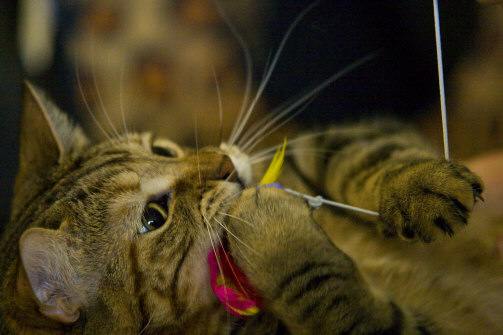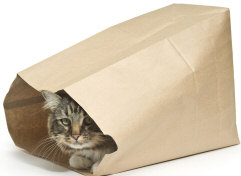How to Get Your Cat to Exercise
Inspiring Movement in Your Feline Friend
 While itís next to impossible to get your cat to work out on a treadmill, you
can increase his level of exercise by developing a playtime routine. Just like
humans, cats need to move in order to maintain a cat-like, svelte weight. Therefore, turn that fat cat of yours into a slimmer cat by developing a regular
playtime routine or inspiring movement with cat furnishings like a cat tree. You
can also make your cat a more active feline by teaching him tricks and leash
training him. While itís next to impossible to get your cat to work out on a treadmill, you
can increase his level of exercise by developing a playtime routine. Just like
humans, cats need to move in order to maintain a cat-like, svelte weight. Therefore, turn that fat cat of yours into a slimmer cat by developing a regular
playtime routine or inspiring movement with cat furnishings like a cat tree. You
can also make your cat a more active feline by teaching him tricks and leash
training him.
Buying a Cat Tree
Cat trees come in a number of varieties and styles that include perches and
scratching posts. So, if you want to detract your cat from ruining the legs on
your chairs or prevent him from scrambling up your drapes, a cat tree is a
must-have accessory. Not only will you save your furniture, youíll provide your
cat with furniture on which he can regularly play. You can find many cat
trees in pet stores or even some on Amazon. I personally use this cat tree and recommend it. Alternately, you can
learn to make your own cat
tree.
and recommend it. Alternately, you can
learn to make your own cat
tree.
Establishing a Time for Play
Again, besides the cat tree, you need to establish a regular playtime for
your cat as well. Cats are predatory animals. Therefore, the best
way to get a cat to play is to furnish him with items or toys that employ his
hunting talents. Toys, then, should replicate the types of animals a cat
enjoys pursuing, such as insects, birds, lizards, rabbits, and, of course, mice.
Or, use objects that mimic the behavior of the animals your cat wants to chase.
Inexpensive Playtime Ideas
Here are some good and cheap examples of great cat toys to get your cat
moving:
Laser Pointer
You might try using a laser pointer and moving it across your floor in
bug-or-lizard-like fashion.
and moving it across your floor in
bug-or-lizard-like fashion.
Cat Charmer
One of my favorite cat toys was one I bought from Amazon called the cat charmer ,
me and my cat have had a lot of fun with it along with a lot of exercise. ,
me and my cat have had a lot of fun with it along with a lot of exercise.
Cat playing with the cat charmer:

Cat Dancer
Another item I recommend from Amazon is the cat dancer .
Here is a cool video of this in action: .
Here is a cool video of this in action:
 You can also use paper bags or tissue paper to motivate your cat to play Ė
two ideas that provide your cat with inexpensive ways to be entertained. You can also use paper bags or tissue paper to motivate your cat to play Ė
two ideas that provide your cat with inexpensive ways to be entertained.
Make sure your playtime activities are scheduled daily and for around
ten-minute intervals. Cats feel secure when they are following a routine. So,
adding a playtime can keep your cat consistently active, which will make him not
only slimmer but healthier and happier as well.
Train Your Cat Tricks to Keep Him Active
Or, you might think of training your kitty to come when she is called. Offer
her a low-calorie treat if she does as she is told. Cats can learn the same
basic commands that are taught to a dog if youíre patient about the process. In
fact, cats can distinguish about 500 human words. Therefore, you can teach your
cat to Come, Sit or Stay as well as train him to walk on a leash.
Training should be managed so that it is gradually conducted in steps. While
a cat may not readily understand English, he will grasp what youíre trying to
communicate if you repeat your training in daily, short sessions of about 10
minutes each.
When doling out food rewards, cut them in small pieces so you can hold your
catís interest in training longer. After all, the more treats you have at your
disposal, the more opportunities youíll have to encourage your cat to perform a
specific command.
Leash Training Your Cat
Teaching your cat to walk on a leash will certainly keep him slim and trim as
you can make walking a regular ritual. This type of training requires a good
deal of patience to get your cat used to the idea.

Step 1:
Buy a Harness (not a Collar) and a Leash
Begin leash training by buying a comfortable harness and a leash that is
lightweight. You can find one on Amazon here . Donít use a collar as your cat can slip out of the necklace. In
addition, collars can be dangerous as they can result in strangulation if your
cat suddenly jumps, either out of fright or spontaneously. . Donít use a collar as your cat can slip out of the necklace. In
addition, collars can be dangerous as they can result in strangulation if your
cat suddenly jumps, either out of fright or spontaneously.
Step 2: Donít Put the Harness and Leash On But Set Them Next to
Where Your Cat Sleeps
In order to keep your kitty from becoming skittish about wearing the harness
and leash, place the two items near the area where he sleeps for a couple days.
That way, you can get him accustomed to their smell.
Step 3: Place the Harness on Your Cat
Now youíre ready to place the harness on your cat. If he seems bothered by
the accessory, avert his attention by redirecting his interest toward a favorite
toy. Whenever he wears the harness, show him a lot of affection and attention.
And when you take it off, ignore him for a while. That way, heíll associate
wearing the harness with a pleasant experience.
Step 4: Secure the Leash to the Harness
Repeat the above step, leaving the harness on your cat longer each time. After several days, youíll be ready to secure the leash. Clip the leash to the
harness and let it trail behind your cat while he walks around the house. Just
make sure that the lead does not become tangled around a table leg or chair. Follow this practice for a few days before picking up the leash yourself.
Step 5:
Youíre Ready to Walk Your Cat
Gently pull on the lead, confining your walk to your backyard at first. If
your cat starts to pull on the leash, all you need to do is stop until he
becomes more relaxed. Then, begin to walk again. Eventually your kitty will get
used to walking with you. You just have to remember that an extreme amount of
patience is needed if you want to meet your goal. However, the patience you
exert will definitely pay off, especially when it comes to the well-being of
your cat.

Conclusion
Getting your cat healthier via exercise is an important part of
increasing the
overall quality of your cat. The more your cat slouches around the more your
cat is going to do that, which leads to obesity and other health problems.
Developing a regular playtime with your cat not only enhances your cat's overall
health but also the special bond between you and your cat.
Pets
Top Lists:
18 Richest Animals in the World
15 Exotic Pets You Could Own Today
Top 20 Common Substances That Are Toxic to Cats and Dogs
Informational:
Animal Actors: Pets in the Film, TV, and Print Industry
Caring for a Yorkshire Terrier: Facts You Should Know
Caring for a Pig as a Pet: The Pot-bellied Pig and the Micro Pig
Difference Between a Cat Person And a Dog Person
Should You Microchip your Cat or Dog?
How to Raise and Care for Pygmy Goats
Caring for Unique Pets: The Leopard Gecko
Use Food-Grade Diatomaceous Earth to Kill Fleas Naturally
Dogs:
Top Lists:
Top 15 Dog Breeds For Home Protection
15 Fascinating Facts About The Mastiff
Informational:
How To Teach Your Dog to Hunt for Truffles
Caring for an English Bulldog: Tips and Basic Info
Cranial Cruciate Ligament (CCL) Tears in Dogs: Treating the Injury
How To Keep Your Dog free of Heartworm Disease
Dog With Separation Anxiety?
Cats:
Top Lists:
Top 6 Qualities in an Awesome Cat
Informational:
How to Control Fighting Felines
How to Get Your Cat to Exercise
Fish:
Fish 101 for the Hobbyist: The Fishís Body and Senses
Buying a Saltwater Aquarium: What You Need to Know
Graduating to a Saltwater Tank
|